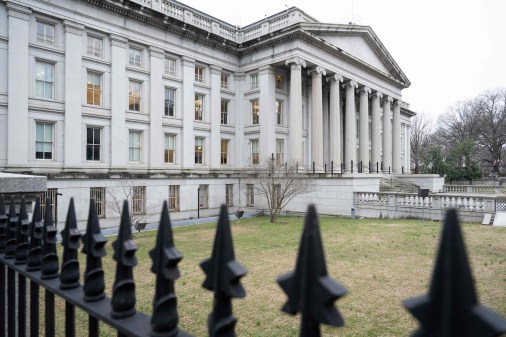Treasury Department sanctions alleged Russian cyber-espionage, disinformation sources

The Biden administration on Thursday sanctioned Russian oligarchs and organizations for their role in spreading disinformation and supporting Russian President Vladimir Putin’s war in Ukraine, among them a news agency the Treasury Department says has ties to a Russian cyber-espionage and offensive unit.
The sanctions targeted nine employees of InfoRos, a nominal news agency primarily run by the GRU, which controls the Russian military intelligence service and operates its own special forces units. According to the Treasury Department, the GRU’s 72nd Main Intelligence Information Center, a unit within Russia’s Information Operations Troops, functions as Russia’s “military force for conducting cyber espionage, influence, and offensive cyber operations” and is InfoRos’ operator.
In a news release, the Treasury Department said InfoRos is a network of more than 1,000 websites which “spread false conspiracy narratives and disinformation promoted by GRU officials.” For example, in early December, 2021, Treasury officials said one Ukraine-based InfoRos writer contributed an editorial which argued Ukraine was provoking Russia into war.
Treasury’s Office of Foreign Assets Control and the U.S. State Department said the sanctions targeting InfoRos are meant to intensify pressure on Russia and shut down channels for disinformation which attempts to “label Ukraine and Ukrainian government officials as the aggressor in the Russia-Ukraine relationship.”
The department said the InfoRos and other propaganda have been placed by Russian intelligence services seeking to “weaken perceived adversaries.”
OFAC designated a total of 26 Russia- and Ukraine-based individuals and seven Russian entities for supporting the Russian government’s sweeping disinformation campaigns. Treasury said these campaigns “spread false narratives that advance Russian strategic objectives to destabilize Ukraine and falsely justify the Kremlin’s activities.”
The sanctions add to an ever-growing list that has expanded since Russia began its invasion Feb. 24, and as the U.S. and the world seek to pressure Putin to rethink what Treasury called a “war of choice.”
The department said the effort is part of their ongoing collaboration with “international partners and allies to target assets in various jurisdictions” belonging to oligarchs and entities enabling Putin’s Ukraine aggressions.
Thursday’s batch of sanctioned prominent Russian oligarchs and accused Putin enablers include Russian billionaire Alisher Burhanovich Usmanov, whose $600 million yacht was seized, and Kremlin spokesman Dmitry Peskov, whom officials called a “top purveyor of Putin’s propaganda.“
Yevgeniy Prigozhin is one purveyor of such propaganda, Treasury said. He has previously been designated for running efforts to disrupt U.S. elections and is an alleged financier for the Internet Research Agency (IRA), which the department says he uses to denigrate the U.S. electoral process and, more recently, to reportedly support Russian government-designed influence operations within Ukraine.
IRA’s influence efforts are focused on “sowing discord on social issues in Ukraine,” according to the announcement. It said Russian disinformation also has targeted European politicians with lies meant to promote Russian goals in Ukraine.
Another targeted organization, Strategic Culture Foundation (SCF), was previously banned on social media and payment platforms following prior U.S. sanctions. But it continues to operate, according to Treasury, which said SCF has created new media outlets to push its narrative.
SCF recently has promoted the idea that the United States is supporting Ukraine in order to “debilitate Russia,” according to the release.
“One of the SCF’s main tactics is to publish Western fringe thinkers and conspiracy theorists, giving them wider reach, while trying to obscure the Russian origins of the journal,” the Treasury Department said. “This tactic helps the site appear to be an organic voice within its target audience of Westerners.”

This story was featured in CyberScoop Special Report: War in Ukraine




